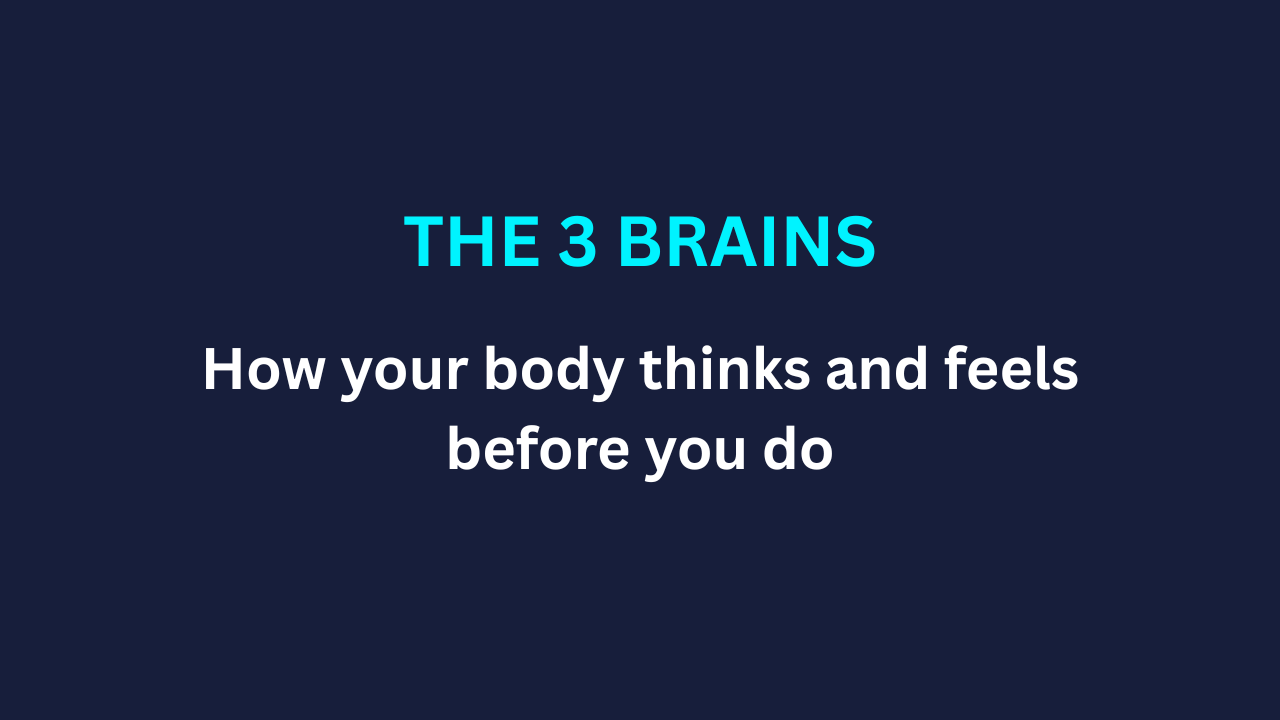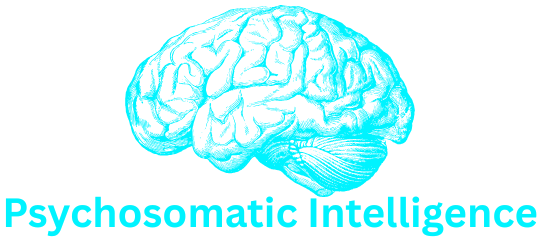
The Three Brains — How Your Body Thinks and Feels Before You Do
When we think of intelligence, we usually imagine the brain in our head. But neuroscience reveals a more complex reality: you have three brains — the head, the heart, and the gut. Each holds its own type of intelligence and deeply influences your emotions, decisions, and behaviors.
Understanding these three brains is essential for cultivating Psychosomatic Intelligence (PSI) because true alignment doesn’t just come from thinking — it comes from feeling and sensing too.
In this post, we’ll explore the science behind the three brains, how they interact, and how integrating them unlocks higher clarity, energy, and resilience.
The Head Brain — Cognitive Intelligence
The cephalic brain, or the brain in your head, is responsible for logical reasoning, planning, problem-solving, and abstract thinking. It houses the prefrontal cortex, your command center for focus and decision-making.
Yet, despite its power, the head brain doesn’t act alone. Its decisions are shaped by signals from the heart and gut — often before you’re consciously aware of them.
The Heart Brain — Emotional Intelligence
The cardiac brain consists of over 40,000 neurons embedded within the heart, creating a sophisticated neural network that can sense, feel, and remember. According to research from the HeartMath Institute, the heart sends more information to the brain than the brain sends to the heart — a discovery that redefined our understanding of emotional processing.
The heart produces an electromagnetic field that is the largest generated by any organ in the body. This field can be measured several feet away and interacts with the brain’s electrical activity. When you cultivate emotions like gratitude, compassion, and love, the heart’s rhythms become coherent, optimizing communication with the head brain and enhancing emotional stability.
Heart-focused breathing and Heart Coherence practices not only calm the nervous system but have been shown to improve cognitive functions like focus and memory. This reveals that the heart is not just a metaphorical center of emotion — it’s a biological center of emotional intelligence.
The Gut Brain — Instinctual Intelligence
The enteric brain, or gut, houses around 100 million neurons, making it a powerful center of instinctual processing. This "second brain" governs digestion but also influences mood, decision-making, and stress resilience.
A significant portion of the body's serotonin — often called the "happiness chemical" — is produced in the gut, alongside other neurotransmitters like dopamine and GABA. The gut’s ecosystem of bacteria, known as the microbiome, plays a crucial role in mental health. Research has demonstrated that imbalances in gut bacteria can contribute to anxiety, depression, and even impaired cognitive function.
Through the gut-brain axis, the gut constantly communicates with the brain via the vagus nerve, shaping not just digestion but also emotional and intuitive responses. This is why we often say, "I had a gut feeling." Your gut is your body’s primal intelligence, offering a fast, embodied read on situations before the head brain even processes them.
Cultivating gut intelligence involves not just diet and probiotics, but also practices like abdominal breathing, which activates the parasympathetic nervous system, promoting relaxation and a clearer connection between gut instincts and conscious thought.
How PSI Integrates the Three Brains
Psychosomatic Intelligence (PSI) provides a structured pathway to synchronize your head, heart, and gut brains into a unified, powerful intelligence system. When these three centers communicate effectively, you unlock clarity, emotional balance, and instinctive wisdom — the trifecta for aligned, embodied action.
Here's how PSI brings them together:
-
Head Brain — Strategic Clarity PSI trains the head brain through goal setting models like NeuroGoals, visualization techniques, and cognitive reflection. This creates mental clarity on what you want and why it matters, reducing overthinking and fostering focus.
-
Heart Brain — Emotional Resonance and Coherence The heart brain is activated through Heart Coherence practices, where breath and intentional focus on feelings like gratitude or love align the heart’s rhythm. This enhances emotional stability, creating a bridge between logic (head) and intuition (gut).
-
Gut Brain — Embodied Instincts and Safety The gut brain is engaged via somatic practices: breathwork, abdominal breathing, and microbiome-friendly habits. These techniques ensure the gut signals safety and intuition, empowering you to act decisively based on embodied knowledge.
The NeuroGoal Sequence exemplifies this integration:
-
You visualize your goal vividly (head)
-
Simultaneously feel the emotional importance (heart)
-
While anchoring the experience with breath and gut awareness (gut)
This alignment primes the Reticular Activating System (RAS) to notice opportunities, reduces subconscious resistance, and creates a physiological sense of safety and readiness.
When all three brains are attuned, your decisions are no longer just mental calculations — they are whole-system agreements between your logic, emotions, and instincts.
This is the heart of Psychosomatic Coherence: thinking clearly, feeling deeply, and acting decisively.
To go deeper, our next post explores The Negativity Bias — an evolutionary feature embedded in these brain systems that shapes your behavior more than you realize.
Ready to align your three brains for smarter, embodied success? 👉 Schedule a free strategy call

